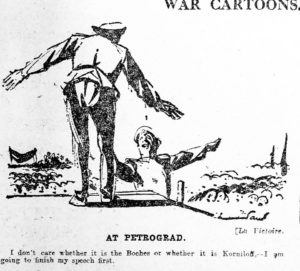colonial india
-
Bhagat Singh, from Colonial Kolkata
Five migrant workers from Hoshiarpur were asleep in their rented room at 5 AM in a Kolkata neighbourhood. At that precise moment, their lives changed. A little-known episode from May 1933, locked in the Bengal police dossiers, points in the direction of lost histories of migrant workers linked with diasporic radicalism in Kolkata and the repression mounted on them by the colonial state. The records reveal the ways in which young migrant workers engaging with leftwing politics were persecuted fo[...] -
Getting to know the ‘Bolsheviks’
In the cities of colonial India, caught in the vortex of war-time/post-war scarcity and political repression, how did the colonizers and a segment of their literate middle-class subjects perceive and depict the Bolshevik Revolution through newspaper pages? In the course of November 1917, the colonial world became gradually acquainted with Bolshevism through hostile news networks based in the West. In Kolkata, the former capital of British Empire in India until 1912 and the provincial cap[...]


